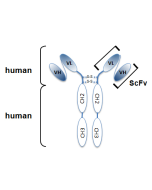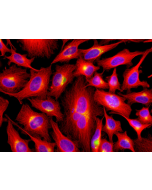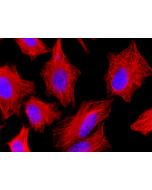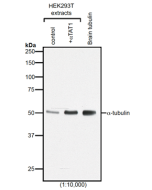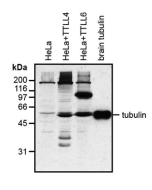Cookie Policy: This site uses cookies to improve your experience. You can find out more about our use of cookies in our Privacy Policy. By continuing to browse this site you agree to our use of cookies.
AdipoGen Life Sciences
anti-β-Tubulin (β-monoE), pAb (IN115)
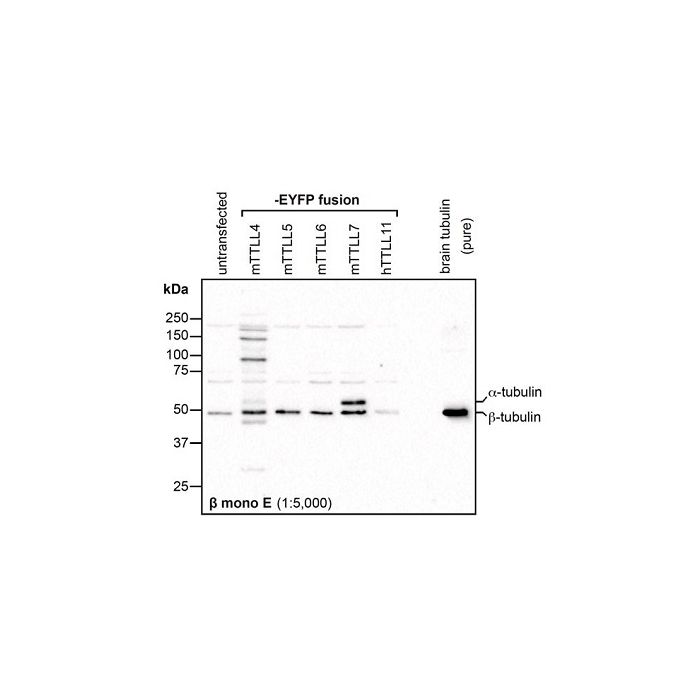
| Product Details | |
|---|---|
| Product Type | Polyclonal Antibody |
| Properties | |
| Source/Host | Rabbit |
| Immunogen/Antigen | Synthetic peptide corresponding to D431EQGEFE(E-COOH*)EEEG441-NH2 of human tubulin β-2A chain (*secondary glutamate branched from γ-carboxyl group of glutamate as isopeptide bond). |
| Application |
Western Blot: (1:2000) Immunocytochemistry: (1:5000) Immunohistochemistry Immunoprecipitation Optimal conditions must be determined individually for each application. |
| Crossreactivity |
Human Mouse |
| Specificity |
Recognizes the posttranslational modification glutamylation with specific reactivity for the GE(*-E)F motive. Because the sequence GEF is specific to several β-tubulin isotypes, the antibody selectively detects mono-glutamylated β-tubulin. |
| Purity | ≥95% (SDS-PAGE) |
| Purity Detail | Epitope-affinity purified. |
| Concentration | 1mg/ml |
| Formulation | Liquid. In PBS containing 0.02% Proclin 300. |
| Isotype Negative Control | |
| Other Product Data |
Recognizes predominantly mono-glutamylated β-tubulin. However, in cells overexpressing enzymes that can modify both α- and β-tubulin, it might detect glutamylation on α-tubulin as well. Requires GE(*-E)F motive, which is present in several β-tubulin isotypes. No other specificity to particular tubulin isotypes nor to tubulin from particular species are observed. The use of the antibody at too high concentrations obscures its specificity in immunofluorescence. |
| Accession Number | Q13885 |
| Shipping and Handling | |
| Shipping | BLUE ICE |
| Short Term Storage | +4°C |
| Long Term Storage | -20°C |
| Handling Advice |
After opening, prepare aliquots and store at -20°C. Avoid freeze/thaw cycles. |
| Use/Stability | Stable for at least 1 year after receipt when stored at -20°C. |
| Documents | |
| MSDS |
 Download PDF Download PDF |
| Product Specification Sheet | |
| Datasheet |
 Download PDF Download PDF |
Polyglutamylation is an evolutionarily conserved protein post-translational modification in which glutamate side chains of variable lengths are formed on the modified protein. The most prominent substrate is tubulin, the building block of microtubules (MTs). Polyglutamylation has been found on both, α- and β-tubulin. It is catalyzed by multiple enzymes that belong to the family of tubulin tyrosine-ligase like (TTLL) enzymes. These TTLLs have substrate (α- vs β-tubulin) as well as reaction (initiation vs elongation) specificities. These subtle changes in levels of polyglutamylation on specific tubulin isoforms could in turn be influencing the diverse MT functions that are regulated by polyglutamylation. The β-monoE antibody selectively labels glutamylation of β-tubulin due to its specificity to a sequence motif (GE(*-E)F) that only exists in β-tubulin isotypes. It allows to specifically detect β-tubulin glutamylation in brain tubulin, where other antibodies predominantly detect α-tubulin glutamylation.
- Distinct roles of alpha- and beta-tubulin polyglutamylation in controlling axonal transport and in neurodegeneration: S. Bodakuntla, et al.; EMBO J. 40, e108498 (2021)
- Polyglutamylation of microtubules drives neuronal remodeling: A. Gavoci, et al.; Nat. Commun. 16, 5384 (2025)






